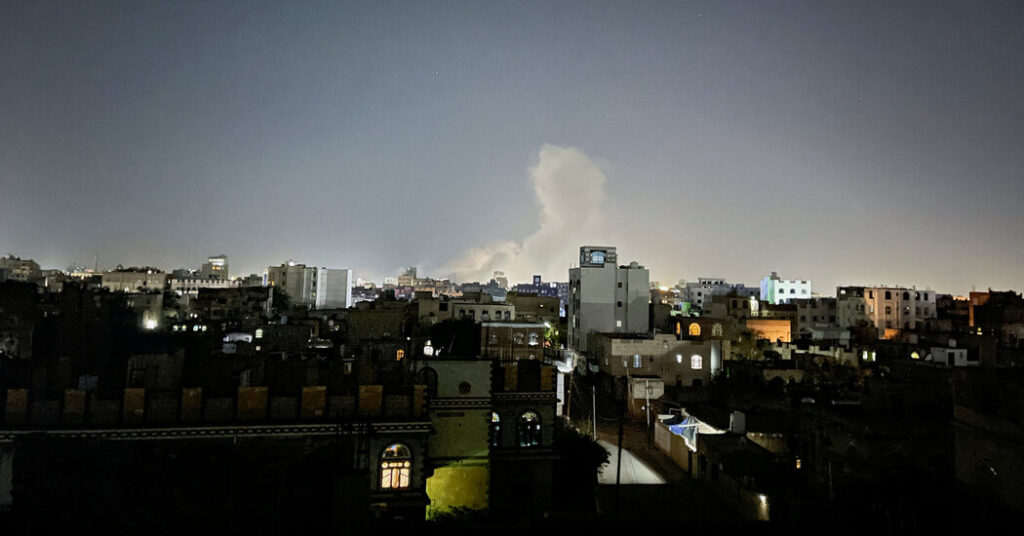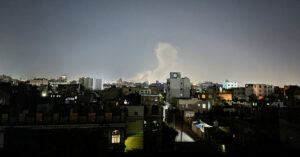President Trump abruptly announced on Tuesday that the United States would cease bombing the Houthi militia after he said the Iranian-backed group told the United States that “they don’t want to fight anymore.”
“They just don’t want to fight,” Mr. Trump said during a meeting with the Canadian prime minister in the Oval Office. “And we will honor that and we will stop the bombings. They have capitulated, but more importantly, we will take their word. They say they will not be blowing up ships anymore.”
After Mr. Trump’s remarks, Mohammed Al-Bukhaiti, a senior Houthi politician, said that if the United States halted its attacks on Yemen, the Houthis would halt their attacks on a smaller group: “American military fleets and interests.”
However, Mr. Al-Bukhaiti said the Houthis would continue military operations “in support of Gaza” until Israel lifts its siege on the enclave, “no matter the sacrifices, even if we have to fight until Judgment Day.”
His statement left unclear whether the Houthis would stop impeding international shipping, which had been the American bombing campaign’s objective. The Houthis have insisted that they would continue to hit Israel-linked ships, but in the past, the militia has targeted vessels with no obvious link to either Israel or the United States.
“I’m skeptical that the Houthis no longer want to fight,” said Gregory Johnsen, a former member of the United Nations Security Council’s Panel of Experts on Yemen. “The Houthis may have suggested or said privately that it would no longer target U.S. assets — although I’ve seen no evidence of that — but I doubt that they will stop altogether.”
Mr. Johnsen noted that Israel recently launched strikes against Yemen, making a retaliatory response from the Houthis likely.
“What’s more, now that the Houthis know exactly how disruptive they can be to the global economy just by firing some rockets at commercial ships in the Red Sea, this will always be an option for the group whenever they feel threatened,” Mr. Johnsen said. “The Houthis will try to portray this as a win — the group went head-to-head with the United States for nearly two months and survived. I doubt the U.S. has heard the last of the Houthis.”
Oman’s foreign minister, Badr Albusaidi, said in a statement on social media that Oman had mediated the agreement between the Houthis and the United States. “In the future, neither side will target the other, including American vessels, in the Red Sea and Bab al-Mandab Strait, ensuring freedom of navigation and the smooth flow of international commercial shipping,” he said.
Further details about the deal remained unclear. Three separate Pentagon officials said that the military had yet to receive word from the White House to end its offensive operations against the Houthis. The officials were scrambling to figure out how Mr. Trump’s announcement, which caught the Pentagon off guard, had changed military policy.
That did not stop Defense Secretary Pete Hegseth from reposting a White House “rapid response” post citing the president’s remarks.
James Hewitt, a spokesman for the National Security Council, declined to elaborate on Mr. Trump’s comments.
The United States has carried out an air campaign against the Houthis in Yemen, striking hundreds of targets in order to reopen international shipping lanes in the Red Sea, according to the Trump administration. The Houthis have fired projectiles and launched drones at commercial and military ships in what the militia group has described as a show of solidarity with residents of Gaza and with Hamas, the militant group controlling the Palestinian territory.
Palestinians in Gaza have been under siege by Israel since Hamas carried out a deadly attack in southern Israel in October 2023 and took hostages. Israeli and Houthi forces have also conducted strikes against each other.
“Our military operations in support of Gaza will not stop unless the aggression on Gaza ends,” Mr. Al-Bukhaiti said.
Mr. Trump’s announcement came just hours after the Houthi-run government had released a statement saying that it was fighting a “holy war in aid of the wronged Palestinian people in Gaza” and confronting an “Israeli-American-British” enemy.
The Houthis have described their attacks as an attempt to pressure Israel to increase the flow of humanitarian aid to Gaza, where more than two million Palestinians have struggled to obtain food and water — a blockade that has only deepened recently.
Helene Cooper and Eric Schmitt contributed reporting from Washington and Shuaib Almosawa from Sana, Yemen.











More Stories
U.S. to Downgrade Palestinian Affairs Office in Jerusalem, Officials Say
Friedrich Merz Becomes Germany’s Leader After Unexpected Day of Drama
Israel Plans to Seize Control of Gaza’s Aid. Here’s How That Could Look.